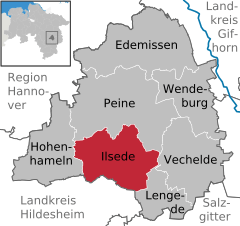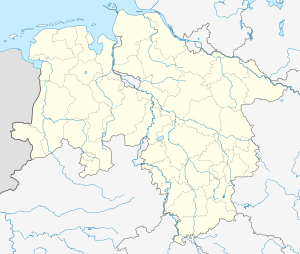Ilsede
Ilsede is a municipality in the district of Peine, in Lower Saxony, Germany. It is situated on the river Fuhse, approx. 7 km south of Peine, and 20 km west of Braunschweig.
Ilsede | |
|---|---|
 Coat of arms | |
Location of Ilsede within Peine district   | |
 Ilsede  Ilsede | |
| Coordinates: 52°16′N 10°11′E | |
| Country | Germany |
| State | Lower Saxony |
| District | Peine |
| Government | |
| • Mayor | Otto-Heinz Fründt (SPD) |
| Area | |
| • Total | 72.03 km2 (27.81 sq mi) |
| Elevation | 75 m (246 ft) |
| Population (2018-12-31)[1] | |
| • Total | 21,556 |
| • Density | 300/km2 (780/sq mi) |
| Time zone | CET/CEST (UTC+1/+2) |
| Postal codes | 31241, 31246 |
| Dialling codes | 05172, 05174 |
| Vehicle registration | PE |
| Website | www |
Ilsede in its present borders was formed in 2015 by merging the municipalities Lahstedt and the former municipality Ilsede.
History
In the area of the municipality Ilsede one finds the most accessible burial mounds in the southwest area of the Bülten wood. They are just a few steps away from the path that leads from Groß Bülten to Rosenthal. A small forest path leads directly to the old grave field. Although mighty trees have grown on the burial mounds in the meantime, the graves are still clearly visible.
At the edge of the forest, an erratic boulder with the inscription "Grave field of the Bronze Age, approx. 1000 BC. BC ”to the historic cemetery. The site is one of the protected archaeological cultural monuments in the district of Peine in the Heers (this is the neighboring, northwest forest section) and in Gräwig (northeast of the village of Klein Ilsede).
During the witch persecution, from 1564 to 1621, 22 people from the Ilsede municipality got into witch trials, 17 of them from Gadenstedt (nine were burned, four died under torture). Three people from Groß Ilsede were burned and a woman from Lafferde died under torture. The fate of a girl from Lahstedt is unknown.
The start of operations at the Ilseder hut in 1858 established a new, industrial section of its history for the Ilseder region. Until then, the communities in this area were purely rural. From now on, iron ore mining and blast furnace operations shaped the world of work and the economy. Nevertheless, agriculture remained an important economic factor. The mining of raw materials and the Ilseder hut were the founding companies of today's global group Salzgitter AG and TUI AG
The municipality of Ilsede has existed as a local authority since February 1, 1971. Even before the regional reform in Lower Saxony, the municipalities of Bülten, Groß Bülten, Groß Ilsede, Klein Ilsede, Ölsburg and Solschen merged through their own initiative to form the newly created unitary community of Ilsede. The communities that had been independent up to this point were largely regarded as belonging together, due to the many similarities regarding iron ore mining and the Ilseder hut, even before the merger.
In 2006 Ilsede hosted the cultural festival Day of the Brunswick Landscape.
On July 10, 2014, the members of both municipal councils decided on the merger of the municipalities Ilsede and Lahstedt, which had already been considered in 1971 but was not realized at the time. Ilsede was also chosen as the name of the new municipality. Since January 1, 2015, the new community Ilsede includes the areas and districts of the former communities Ilsede and Lahstedt. Adenstedt, Gadenstedt, Groß Lafferde, Münstedt and Oberg have been part of the municipality of Ilsede since then. As a result of the merger, the municipal area increased from 28.45 km² (as of 2014) to 72.09 km² and the population of 11,366 (as of September 30, 2014). at 21,308 (as of January 1, 2015)
Municipal subdivisions
|
|
Personalities
Erkanbald (before 982-1021), Abbot of Fulda and Archbishop of Mainz, probably born in Olsburg
Joachim Vinzelberg, pastor in Münstedt (1654) and hymn writer
Ernst Christoph Böttcher (1697-1766), merchant and founder of the royal school teacher seminar and patron, was born in Groß Lafferde
Johann Peter Hundeniker (1751-1836), educator and ducal Brunswick school board, born in Groß Lafferde
Julius Hundeniker (1784-1854), Lutheran clergyman and novelist, born in Groß Lafferde
Wilhelm Theodor Hundeniker (1786-1828), educator and philologist, born in Groß Lafferde
Fritz Behrens (1836-1920), industrialist and philanthropist, born in Groß Lafferde
Friedrich Cramm (1874-1942), farmer, politician (DVP) and Member of the Reichstag, born in Groß Lafferde
Wilhelm Kleemann (1885-1956), educator, politician (SPD) and senator in Bremen, born in Groß Lafferde
Paul Steegemann (1894-1956), publisher, born in Groß Lafferde
Bruno Brandes (1910-1985), politician (CDU)
Wilhelm Baumgarten (1913-1996), politician (SPD), born in Groß Lafferde
Will Brandes (1928-1990), pop singer, born in Münstedt
Gerhard Ahrens (* 1932), football player, born in Oberg
Dieter Warzecha (1934-2005), artist, lived and worked in Groß Ilsede
Klaus G. Troitzsch (* 1946), sociologist, born in Oberg
Hartmut Möllring (* 1951), politician (CDU), born in Groß Ilsede
Annette Sabban (1953-2019), language and translation scientist, born in Klein Bülten
Uwe Schrader (* 1954), director and professor of artistic film at the University of Hildesheim, was born in Groß Bülten
Erwin Skamrahl (* 1958), athlete and Olympic athlete, born in Oberg
Personalities related to the city
Friedrich Brandis (1775-1854), Lutheran theologian, consistorial councilor and general superintendent
Luise Rosendorf (1821–1890), cookbook author E
wald Hecker (entrepreneur) (1879–1954), chairman of the Ilseder Hütte supervisory board and SS brigade leader
Wolfgang Marzahn (1911-1988), Lutheran theologian and author
Rosemarie Tinius (* 1945), businesswoman, teacher in Ilsede (1970-1994), politician (SPD)
Caren Miosga (* 1969), TV presenter for ARD Tagesthemen since 2007, grew up in Groß Ilsede
Herma Auguste Wittstock (* 1977), performance artist, grew up in Ölsburg